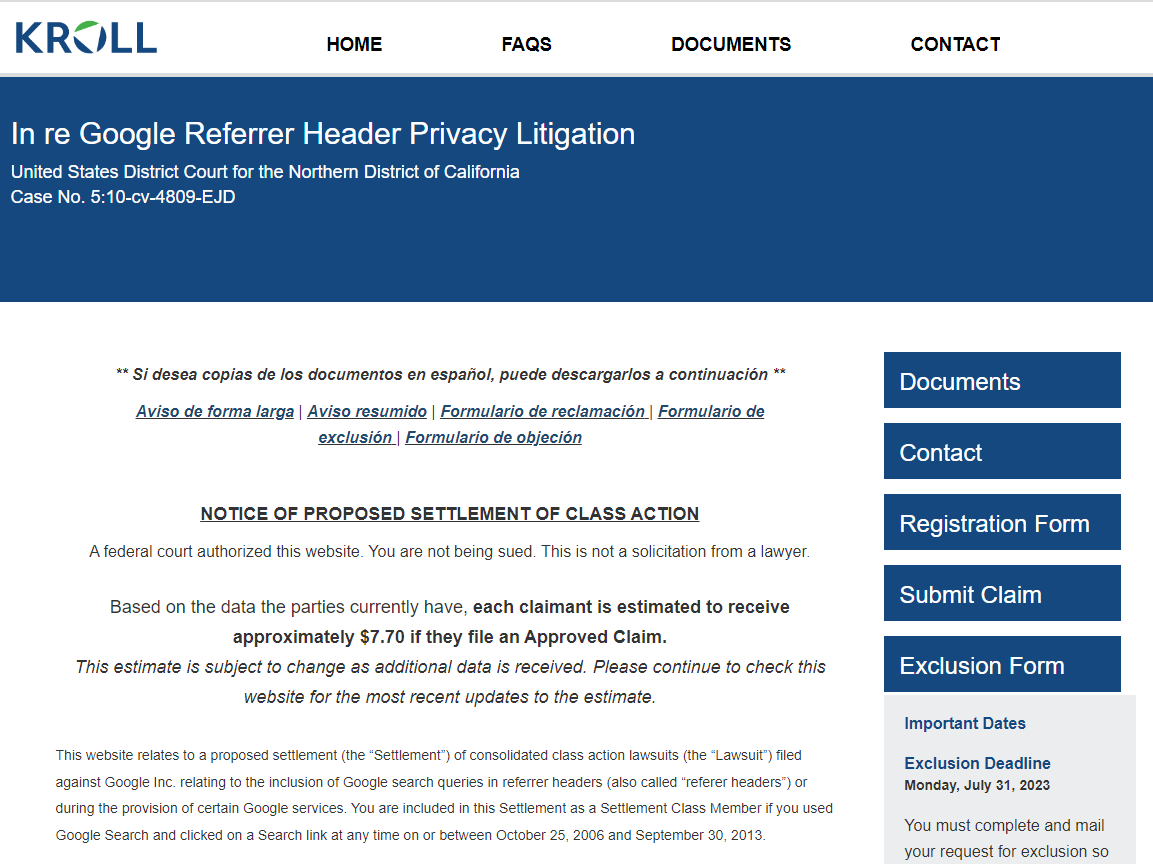Google has agreed to pay $23 million to resolve a class-action lawsuit filed over a decade ago, which alleged that the company violated the privacy of searchers by sharing their personally identifiable information with third parties.
If you clicked on a Google Search result between 2006 and 2013, you may be entitled to claim compensation, just as many Zoom and Facebook users were recently after their respective class action lawsuits came to a close.
However, the webpage you’ll need to input your details into in order to make a claim isn’t owned or managed by Google – rather, it’s been set up by settlement administration specialists Kroll.
When there’s a lot of buzz around a topic like this one, scammers tend to see it as an opportunity to make a quick buck with a shady email or fake website. So, making sure you’re in the right place before you enter any personal information is always advised.
What the Legitimate Google Privacy Settlement Website Looks Like
The company processing claims for this Google privacy settlement is called Kroll Settlement Administration LLC — and you can make your claim on refererheadersettlement.com.
Other websites claiming to be able to process your claim for this settlement should not be trusted. Here’s an image of what the legitimate website looks like:

When Google settled a separate privacy lawsuit back in 2020, some skeptical users questioned whether it was a scam.
They took to Reddit, Twitter, and the Gmail community forum to find out whether correspondence they’d received relating to the case was in fact legitimate, and whether the settlement website where they were told they could make a claim was genuine.
Along with unexpected emails, a temporary site outage added further fuel to the idea that it wasn’t genuine.
This time around, we’ve not found any reports of Google sending out emails — or other kinds of messages — to individuals who may have been impacted by the class-action lawsuit. In fact, Google has admitted no wrongdoing, despite agreeing to the settlement.
We’d strongly advise ignoring any emails referencing this case, and instead going directly to the webpage we’ve linked above.
What Information Do I Need to Enter to Make a Claim?
To make a claim, you’ll need a Class Member ID, and you can apply for one through Kroll’s website. You’ll need to enter your full name, phone number, home address, ZIP code, and email address.
The deadline to claim is July 31, 2023, so if you think you’re eligible for a portion of the money, ensure you secure your Class Member ID before then.
The settlement will receive final approval on October 12, 2023, but the settlement notice itself suggests the ruling might be held up by appeals.
What Does the Lawsuit Allege, and How Much Can I Claim Back?
Google’s parent company Alphabet Inc. was accused back in 2013 of “storing and intentionally, systematically and repeatedly divulging its users’ search queries and histories to third parties via ‘Referrer Headers'”, which impacts “billions” of consumers.
The lawsuit also alleged that “Google has consistently and intentionally designed its services to ensure that user search queries, which often contain highly-sensitive and personally identifiable information (“PII”), are routinely transferred to marketers, data brokers, and sold and resold to countless other third parties.”
Since Google was launched, search terms have been included in the URL of the search results page. “Because the search terms are included in the search results URL”, the lawsuit explains, “when a Google user clicks on a link from Google’s search results page, the owner of the website that the user clicks on will receive from Google the user’s search terms in the Referrer Header.”
Web analytics services, it adds, “include and use functionality to automatically parse the search query information from web server logs, or to otherwise collect the search query from the referrer header transmitted by each visitor’s web browser.”
According to Kroll, the total amount each individual is expected to receive is approximately $7.70 — although this could change depending on the number of people that actually end up making a claim. As mentioned previously, Google has admitted to no wrongdoing throughout the settlement process.
The settlement administrators also say that Google will “revise its “FAQs” and “Key Terms” webpages regarding how and when search queries may be disclosed to third parties via referrer headers.”





